Monday 15th August 2005 marked the day that the BBC and Channel 4 simultaneously decided to broadcast documentaries focused on reparations for the Maafa (The Enslavement of (Mama) Africa).
On an evening seemingly themed by the topic of reparations for African communities Channel 4’s The Empire Pays Back and BBC2’s Namibia: Genocide and the Second Reich uncovered buried secrets and facts about European involvement in the African Holocaust and the fight by African communities for justice and reparations. This is a review of the first of the programmes.
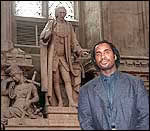
Amazing as it seems, the typical Channel 4 driven Diverse/Beckford combo of African themed documentaries finally produced a programme capable of disseminating information without causing widespread offence with its frivolously titled ‘The Empire Pays Back’.
Whilst still maintaining the trademark Diverse tabloid approach of a simplistic format suited to youth programming, the substance of this heavily stylised programme still managed to remain authoritative and wholly relevant.
Commissioned for Channel 4 by Aaquil Ahmed (recently named as the fourth most powerful Asian in British media) and presented by Robert Beckford the polemic discussed the case of economic reparations for African Britons with Caribbean heritage for what he labelled the ‘black’ Holocaust. Beckford ran, skipped, hopped and ranted across Britain uncovering the true involvement of the Royal family, British government, church and public in supporting the enslavement of African people. His enthused approach to publicly naming and shaming some of the financial British institutions which profiteered from African enslavement was entertaining, his questioning of Fiona MacTaggart the government minister for racial equality exposed the hypocrisy of her appointment to the post and the morally repugnant stance shared by most Britons. Evidence of this was provided by the revealing stance of the belligerent right wing LBC talk show host Nick Ferrari and the intolerant stream of ignorant callers who are the bulk of his audience.
However, the polemic’s main selling point was its (false) claim to be the first ever to attempt to put a cost on how much any financial reparations should be. This is where it fell down. £7.5 trillion barely scratches the surface of the debt Britain owes to Africa for its historic and continued exploitation contributing to the deaths of millions of African people on both the continent and throughout the Diaspora. Nonetheless Beckford preferred to blame both Britain and Africa (excluding America and the rest of Europe) for what was described as the loss of earnings and suffering of ‘black slaves’ in the Caribbean. He assembled a team of ‘experts’ who proceeded to concoct a formula designed solely to compensate the descendants of African Caribbean people. His team which included a historian, an actuary, and a compensation lawyer concluded the £7.5 trillion was sufficient compensation for the unpaid wages, human misery, the unjust enrichment of British industry and the loss of earnings to future generations due to the legacy of racism which followed African enslavement.
He chose to absolve Africa of its ‘requirement’ to pay compensation because he was told that the Continent had made zero gain from slavery. However in pointing the finger of blame at Africa in the first place he chose to remain ignorant of the fact that African people on the continent could never be liable for such an odious debt. Indeed, Africa is owed by europeans and arabs for their systematic rape, murder and pillaging of African families, resources and culture. If the polemic had taken a more academic approach then viewers could have benefited from more substantive facts and a complete picture of African British history.
It was also sad to note that there was a lack of diverse African voices used to show the respect deserved on a topic focused on African injustice. Instead Beckford’s polemic focused predominantly on seeking expert opinions from europeans. Whilst there was a mention of the late great African British politician Bernie Grant, the programme excluded the many several African Britons such as Esther Stamford of the Quest for Justice Campaign who has been campaigning on this issue for several years. Despite mentioning the significance of JP Morgan’s apology for its role in slavery Beckford did not include footage of the work of organisations such as N’COBRA who are a coalition of African Americans campaigning for Reparations in America. In fact in 2002 even Lee Jasper the African British senior race adviser to London Mayor Ken Livingstone stated that 'Seeking reparations for the debt that now exists in Africa is valid and would offer a credible response to the problems created by European powers'. Yet Beckford ludicrously sought European ‘experts’ from Germany and Britain, two of the countries responsible for gross atrocities during the Maafa to comment and guide him on the issue of whether they should pay reparations and if so how much. This in turn resulted in a dearth of authentic voices to argue the legal and moral case from a position of direct empathy and authority.
Most damning though was that in an attempt to firm up Beckford’s own arguments, several interviews which looked likely to garner sympathy for european anti-reparation views were deliberately cut mid sentence. This undermined the integrity of Beckford’s own arguments and assumed the audience were not intelligent enough to come to their own conclusions. In short there was a severe and obvious editorial bias when none was needed. The unequivocal merits of the pro-reparations argument are strong enough to survive robust challenge. The net result can only be that this approach risked damaging wider support for the laudable objectives of the movement by appearing biased in the eyes of a uniformed majority.
Also in what we can only assume was a desire to pander and remain accessible to a potentially hostile European audience there was also lack of respect given to the enslaved Africans who were frequently denigrated by Beckford’s labelling of them as ‘black slaves’ whilst the Maafa was repeatedly referred to as the ‘black’ Holocaust.
In conclusion, the obvious edits truncating oral evidence given against reparations unnecessarily compromised Beckford’s integrity and that of his own confidence in presenting his thesis. Whilst the call for a national memorial to recognise and commemorate the insurmountable debt Britain owes to African people is a laudable one, the cultural disinheritance of Africans with Caribbean heritage and the deliberate labelling of African people using the eurocentric terminology of ‘slaves’ and ‘blacks’ remains both disrespectful and offensive. Nonetheless the programme unearthed some of the key facts on the matter of reparations albeit in a format much better suited to a very young audience with a short attention span. As a result the stylised pop approach taken to ensure that the topic remains accessible to the widest possible audience along with the typical Beckford-centred approach of including humour and music as a means to document a topic of such gravity can only be seen as one mans personal take on a serious issue worthy of far more respect.
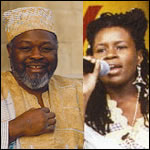
External Links
Angst expressed at 2007 bicentenary forumhttp://www.arm.arc.co.uk/http://www.ncobra.com/
On an evening seemingly themed by the topic of reparations for African communities Channel 4’s The Empire Pays Back and BBC2’s Namibia: Genocide and the Second Reich uncovered buried secrets and facts about European involvement in the African Holocaust and the fight by African communities for justice and reparations. This is a review of the first of the programmes.

Robert Beckford with statue of Alderman Beckford
Whilst still maintaining the trademark Diverse tabloid approach of a simplistic format suited to youth programming, the substance of this heavily stylised programme still managed to remain authoritative and wholly relevant.
Commissioned for Channel 4 by Aaquil Ahmed (recently named as the fourth most powerful Asian in British media) and presented by Robert Beckford the polemic discussed the case of economic reparations for African Britons with Caribbean heritage for what he labelled the ‘black’ Holocaust. Beckford ran, skipped, hopped and ranted across Britain uncovering the true involvement of the Royal family, British government, church and public in supporting the enslavement of African people. His enthused approach to publicly naming and shaming some of the financial British institutions which profiteered from African enslavement was entertaining, his questioning of Fiona MacTaggart the government minister for racial equality exposed the hypocrisy of her appointment to the post and the morally repugnant stance shared by most Britons. Evidence of this was provided by the revealing stance of the belligerent right wing LBC talk show host Nick Ferrari and the intolerant stream of ignorant callers who are the bulk of his audience.
However, the polemic’s main selling point was its (false) claim to be the first ever to attempt to put a cost on how much any financial reparations should be. This is where it fell down. £7.5 trillion barely scratches the surface of the debt Britain owes to Africa for its historic and continued exploitation contributing to the deaths of millions of African people on both the continent and throughout the Diaspora. Nonetheless Beckford preferred to blame both Britain and Africa (excluding America and the rest of Europe) for what was described as the loss of earnings and suffering of ‘black slaves’ in the Caribbean. He assembled a team of ‘experts’ who proceeded to concoct a formula designed solely to compensate the descendants of African Caribbean people. His team which included a historian, an actuary, and a compensation lawyer concluded the £7.5 trillion was sufficient compensation for the unpaid wages, human misery, the unjust enrichment of British industry and the loss of earnings to future generations due to the legacy of racism which followed African enslavement.
He chose to absolve Africa of its ‘requirement’ to pay compensation because he was told that the Continent had made zero gain from slavery. However in pointing the finger of blame at Africa in the first place he chose to remain ignorant of the fact that African people on the continent could never be liable for such an odious debt. Indeed, Africa is owed by europeans and arabs for their systematic rape, murder and pillaging of African families, resources and culture. If the polemic had taken a more academic approach then viewers could have benefited from more substantive facts and a complete picture of African British history.
It was also sad to note that there was a lack of diverse African voices used to show the respect deserved on a topic focused on African injustice. Instead Beckford’s polemic focused predominantly on seeking expert opinions from europeans. Whilst there was a mention of the late great African British politician Bernie Grant, the programme excluded the many several African Britons such as Esther Stamford of the Quest for Justice Campaign who has been campaigning on this issue for several years. Despite mentioning the significance of JP Morgan’s apology for its role in slavery Beckford did not include footage of the work of organisations such as N’COBRA who are a coalition of African Americans campaigning for Reparations in America. In fact in 2002 even Lee Jasper the African British senior race adviser to London Mayor Ken Livingstone stated that 'Seeking reparations for the debt that now exists in Africa is valid and would offer a credible response to the problems created by European powers'. Yet Beckford ludicrously sought European ‘experts’ from Germany and Britain, two of the countries responsible for gross atrocities during the Maafa to comment and guide him on the issue of whether they should pay reparations and if so how much. This in turn resulted in a dearth of authentic voices to argue the legal and moral case from a position of direct empathy and authority.
Most damning though was that in an attempt to firm up Beckford’s own arguments, several interviews which looked likely to garner sympathy for european anti-reparation views were deliberately cut mid sentence. This undermined the integrity of Beckford’s own arguments and assumed the audience were not intelligent enough to come to their own conclusions. In short there was a severe and obvious editorial bias when none was needed. The unequivocal merits of the pro-reparations argument are strong enough to survive robust challenge. The net result can only be that this approach risked damaging wider support for the laudable objectives of the movement by appearing biased in the eyes of a uniformed majority.
Also in what we can only assume was a desire to pander and remain accessible to a potentially hostile European audience there was also lack of respect given to the enslaved Africans who were frequently denigrated by Beckford’s labelling of them as ‘black slaves’ whilst the Maafa was repeatedly referred to as the ‘black’ Holocaust.
In conclusion, the obvious edits truncating oral evidence given against reparations unnecessarily compromised Beckford’s integrity and that of his own confidence in presenting his thesis. Whilst the call for a national memorial to recognise and commemorate the insurmountable debt Britain owes to African people is a laudable one, the cultural disinheritance of Africans with Caribbean heritage and the deliberate labelling of African people using the eurocentric terminology of ‘slaves’ and ‘blacks’ remains both disrespectful and offensive. Nonetheless the programme unearthed some of the key facts on the matter of reparations albeit in a format much better suited to a very young audience with a short attention span. As a result the stylised pop approach taken to ensure that the topic remains accessible to the widest possible audience along with the typical Beckford-centred approach of including humour and music as a means to document a topic of such gravity can only be seen as one mans personal take on a serious issue worthy of far more respect.

African British Reparations Campaigners: Bernie Grant, Esther Stanford
External Links
Angst expressed at 2007 bicentenary forumhttp://www.arm.arc.co.uk/http://www.ncobra.com/
Ligali is not responsible for the content of third party sites


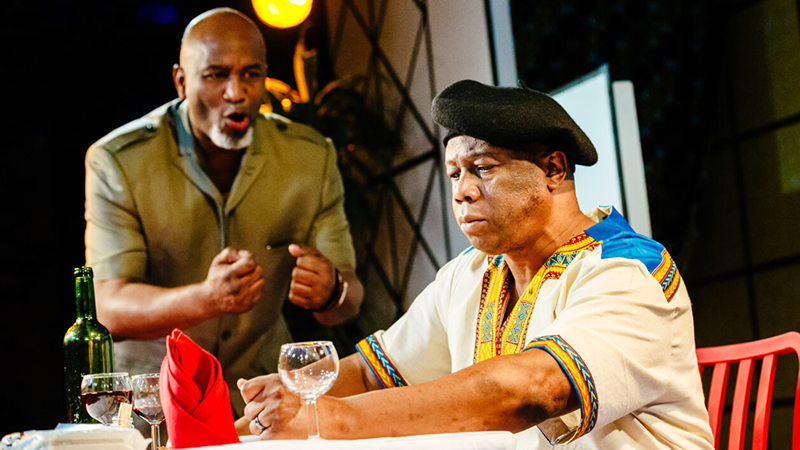
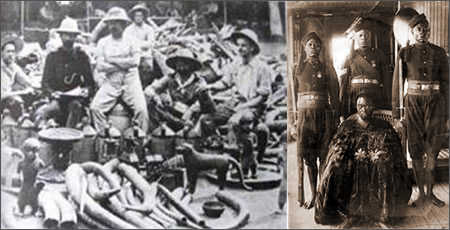
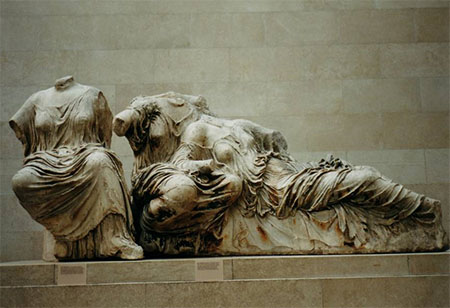
Get involved and help change our world